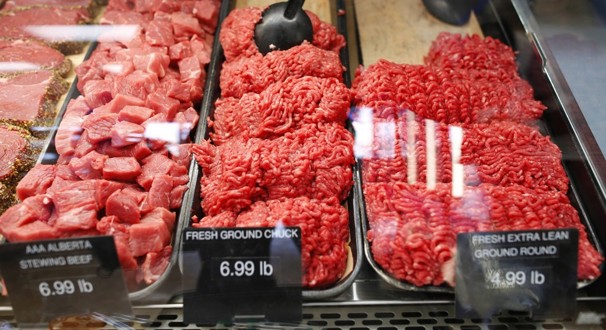New rules for U.S. meatpackers will require labeling that tells consumers where the animal was born, raised and slaughtered.
Sounds simple.
U.S. meat labels to detail animal’s origin; Canada, Mexico raise concern
TODD KOROL/REUTERS - Ground Alberta beef is seen in coolers at a meat market in Canada. The United States is poised to introduce stricter rules on the labeling of meat imports, a move that is likely to heat up a simmering trade dispute with Canada and Mexico. New rules for U.S. meatpackers will require labeling that tells consumers where the animal was born, raised and slaughtered. Sounds simple. But the regulations, posted Friday by the Department of Agriculture, are the latest move in a trade dispute that has pitted U.S. consumer groups, which favor the labels, against free-trade advocates, who say the regulations are biased against cattle and pork from Canada and Mexico. Nor are the regulations likely to be the last word in the international controversy, which seems destined to wind up — again — before the World Trade Organization, which has previously ruled that U.S. labeling regulations discriminated against Canadian and Mexican livestock. The dispute over meat labeling is one of a handful in recent years in which U.S. efforts to regulate food and other products have been rejected by the WTO. The WTO has ruled against U.S. “dolphin-safe” tuna labels and weighed in as well against a ban on clove-flavored cigarettes. “The big lesson for American consumers is that the WTO has invaded aspects of our lives that have nothing to do with trade,” said Lori Wallach, director of Public Citizen’s group on trade issues. “They have come to your dinner table. Depending on what the WTO does, either consumers will be provided with important information, or the U.S. may face trade sanctions.” The dispute over meat labeling promises to continue. While U.S. Agriculture Secretary Tom Vilsack says the new rules on meat labeling will bring the United States “into compliance” with trade obligations, Canada disagrees and Mexico has already complained about the regulations. “Canada is extremely disappointed with the regulatory changes put forward by the United States,” according to a statement from the Canadian trade and agriculture ministers, Ed Fast and Gerry Ritz. “These changes will increase discrimination against Canadian cattle and hogs and increase damages to industry on both sides of the border.” “Mexico regrets that the U.S. Department of Agriculture has chosen to propose amendments to the regulations that would exacerbate the adverse impact [of the labeling program] on bilateral trade,” Mexican trade and agriculture ministers Kenneth Smith Ramos and Carlos Vazquez Ochoa wrote. The meat labeling dispute dates back to March 2009, when the United States required that meat be labeled with its country of origin — without specifying, as the new rules do, where the animal was born, raised and slaughtered. Canada and Mexico objected to those rules, arguing that the hassles of tracking each animal’s nationality prompted slaughterhouses to prefer animals that had been born and raised in the United States. This created a bias against foreign livestock, they argued. Canada and Mexico took their concerns to the World Trade Organization, which ruled against the United States in June. By making the labeling more specific, the United States appears to be addressing the WTO’s concern that the record keeping required under the previous rules was too onerous given the meager amount of information it gave consumers. The new rules, which cite more information, better justify the record keeping required, at least according to the American view. “The requirement will provide consumers with more specific information on which to base their purchasing decisions without imposing any additional recordkeeping requirements on industry,” the USDA’s announcement said. The United States estimates that more than 2,800 livestock processing and slaughtering companies, 38 chicken processing companies and about 4,300 retailers will be affected by the new rules. Officials estimated the cost of implementing the rules at $33 million. |